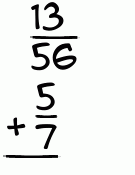What is 13/56 + 5/7?

|
Here's how we add
|
|||||||||||
Step 1Now we need to make our denominators match. 56 goes into 7 evenly, so we only need to multiply one term to get a common denominator. Multiply 5 by 8, and get 40, then we multiply 7 by 8 and get 56. This gives us a new problem that looks like so:
|
|||||||||||
Step 2Since our denominators match, we can add the numerators. 13 + 40 = 53 That gives us an answer of
|
|||||||||||
Step 3Can this fraction be reduced? First, we attempt to divide it by 2... Nope! So now we try the next greatest prime number, 3... Nope! So now we try the next greatest prime number, 5... Nope! So now we try the next greatest prime number, 7... Nope! So now we try the next greatest prime number, 11... Nope! So now we try the next greatest prime number, 13... Nope! So now we try the next greatest prime number, 17... Nope! So now we try the next greatest prime number, 19... Nope! So now we try the next greatest prime number, 23... Nope! So now we try the next greatest prime number, 29... Nope! So now we try the next greatest prime number, 31... Nope! So now we try the next greatest prime number, 37... Nope! So now we try the next greatest prime number, 41... Nope! So now we try the next greatest prime number, 43... Nope! So now we try the next greatest prime number, 47... Nope! So now we try the next greatest prime number, 53... Nope! So now we try the next greatest prime number, 59... No good. 59 is larger than 53. So we're done reducing. There you have it! Here's the final answer to 13/56 + 5/7
|